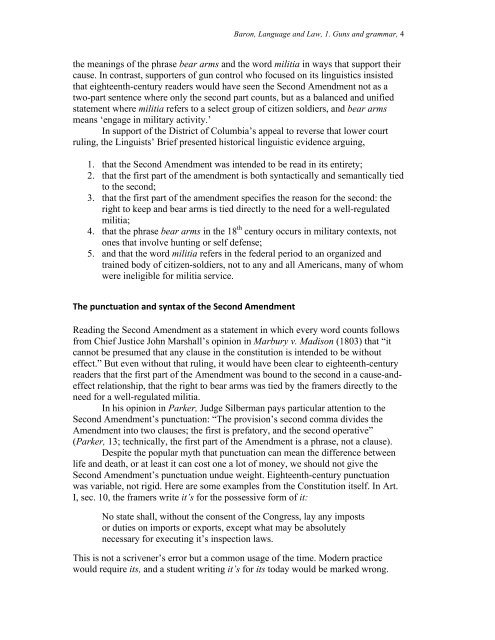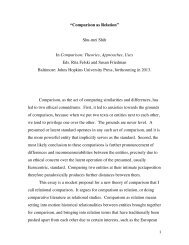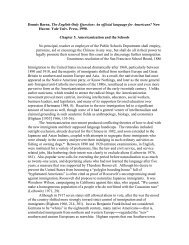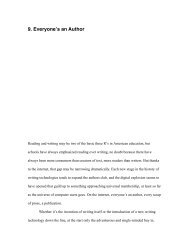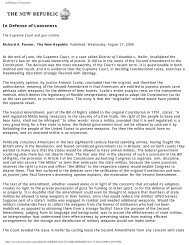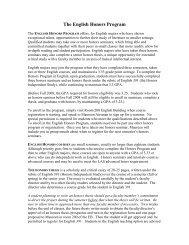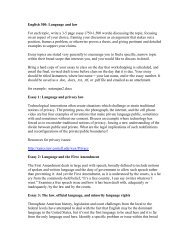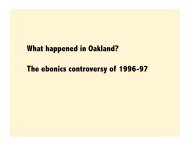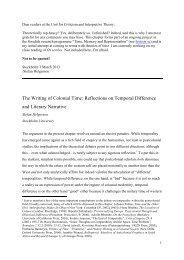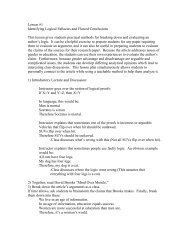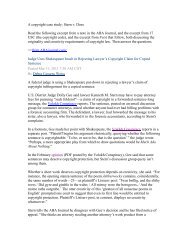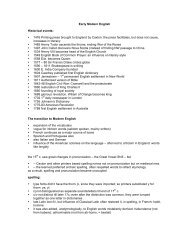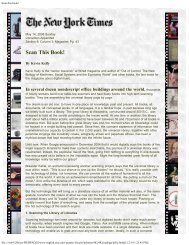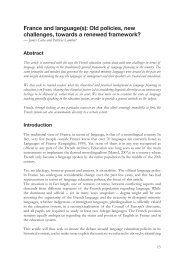1. Guns and Grammar: Determining what the Second ... - English
1. Guns and Grammar: Determining what the Second ... - English
1. Guns and Grammar: Determining what the Second ... - English
You also want an ePaper? Increase the reach of your titles
YUMPU automatically turns print PDFs into web optimized ePapers that Google loves.
Baron, Language <strong>and</strong> Law, <strong>1.</strong> <strong>Guns</strong> <strong>and</strong> grammar, 4<strong>the</strong> meanings of <strong>the</strong> phrase bear arms <strong>and</strong> <strong>the</strong> word militia in ways that support <strong>the</strong>ircause. In contrast, supporters of gun control who focused on its linguistics insistedthat eighteenth-century readers would have seen <strong>the</strong> <strong>Second</strong> Amendment not as atwo-part sentence where only <strong>the</strong> second part counts, but as a balanced <strong>and</strong> unifiedstatement where militia refers to a select group of citizen soldiers, <strong>and</strong> bear armsmeans ‘engage in military activity.’In support of <strong>the</strong> District of Columbia’s appeal to reverse that lower courtruling, <strong>the</strong> Linguists’ Brief presented historical linguistic evidence arguing,<strong>1.</strong> that <strong>the</strong> <strong>Second</strong> Amendment was intended to be read in its entirety;2. that <strong>the</strong> first part of <strong>the</strong> amendment is both syntactically <strong>and</strong> semantically tiedto <strong>the</strong> second;3. that <strong>the</strong> first part of <strong>the</strong> amendment specifies <strong>the</strong> reason for <strong>the</strong> second: <strong>the</strong>right to keep <strong>and</strong> bear arms is tied directly to <strong>the</strong> need for a well-regulatedmilitia;4. that <strong>the</strong> phrase bear arms in <strong>the</strong> 18 th century occurs in military contexts, notones that involve hunting or self defense;5. <strong>and</strong> that <strong>the</strong> word militia refers in <strong>the</strong> federal period to an organized <strong>and</strong>trained body of citizen-soldiers, not to any <strong>and</strong> all Americans, many of whomwere ineligible for militia service.The punctuation <strong>and</strong> syntax of <strong>the</strong> <strong>Second</strong> Amendment Reading <strong>the</strong> <strong>Second</strong> Amendment as a statement in which every word counts followsfrom Chief Justice John Marshall’s opinion in Marbury v. Madison (1803) that “itcannot be presumed that any clause in <strong>the</strong> constitution is intended to be withouteffect.” But even without that ruling, it would have been clear to eighteenth-centuryreaders that <strong>the</strong> first part of <strong>the</strong> Amendment was bound to <strong>the</strong> second in a cause-<strong>and</strong>effectrelationship, that <strong>the</strong> right to bear arms was tied by <strong>the</strong> framers directly to <strong>the</strong>need for a well-regulated militia.In his opinion in Parker, Judge Silberman pays particular attention to <strong>the</strong><strong>Second</strong> Amendment’s punctuation: “The provision’s second comma divides <strong>the</strong>Amendment into two clauses; <strong>the</strong> first is prefatory, <strong>and</strong> <strong>the</strong> second operative”(Parker, 13; technically, <strong>the</strong> first part of <strong>the</strong> Amendment is a phrase, not a clause).Despite <strong>the</strong> popular myth that punctuation can mean <strong>the</strong> difference betweenlife <strong>and</strong> death, or at least it can cost one a lot of money, we should not give <strong>the</strong><strong>Second</strong> Amendment’s punctuation undue weight. Eighteenth-century punctuationwas variable, not rigid. Here are some examples from <strong>the</strong> Constitution itself. In Art.I, sec. 10, <strong>the</strong> framers write it’s for <strong>the</strong> possessive form of it:No state shall, without <strong>the</strong> consent of <strong>the</strong> Congress, lay any impostsor duties on imports or exports, except <strong>what</strong> may be absolutelynecessary for executing it’s inspection laws.This is not a scrivener’s error but a common usage of <strong>the</strong> time. Modern practicewould require its, <strong>and</strong> a student writing it’s for its today would be marked wrong.


